Business Environment Analysis Report: Nestle Company Ltd
VerifiedAdded on 2020/01/07
|15
|5188
|291
Report
AI Summary
This report provides a comprehensive analysis of Nestle's business environment, examining various aspects of the company's operations and its interaction with the external world. The report begins by identifying different types of organizations and how Nestle, as a private limited company, fulfills the purposes of its stakeholders, including employees, customers, institutions, shareholders, and environmental groups. It then delves into the allocation of business resources within different economic systems and assesses the impact of monetary and fiscal policies, as well as competition laws, on Nestle. The report further explores market structures, pricing and output decisions, and the ways market forces shape organizational responses. It analyzes the impact of both the business and cultural environment on Nestle's operations. Finally, the report examines the significance of international trade, the influence of global factors, and the impact of European Union policies on Nestle's UK business, providing a holistic view of the challenges and opportunities the company faces.
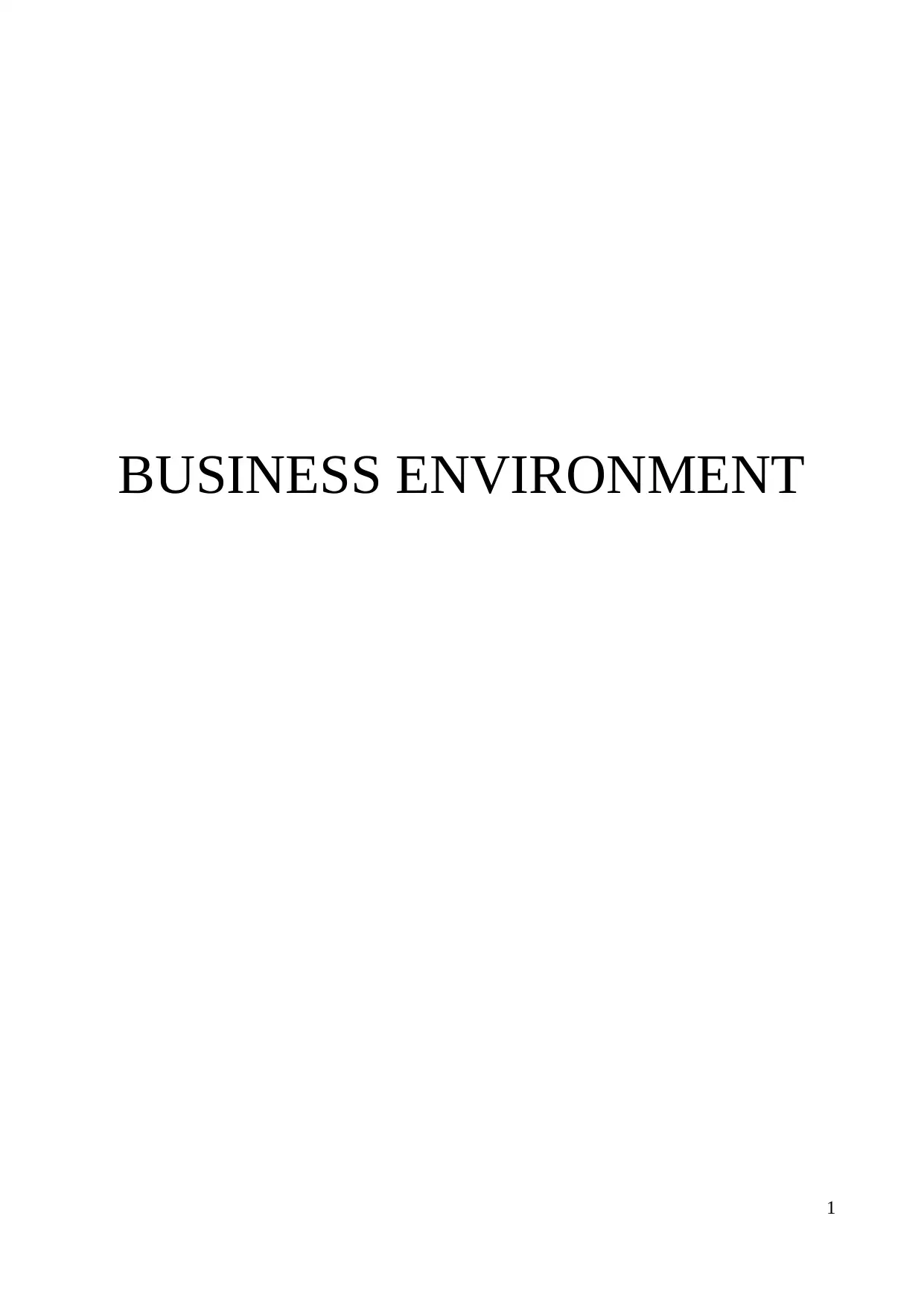
BUSINESS ENVIRONMENT
1
1
Paraphrase This Document
Need a fresh take? Get an instant paraphrase of this document with our AI Paraphraser
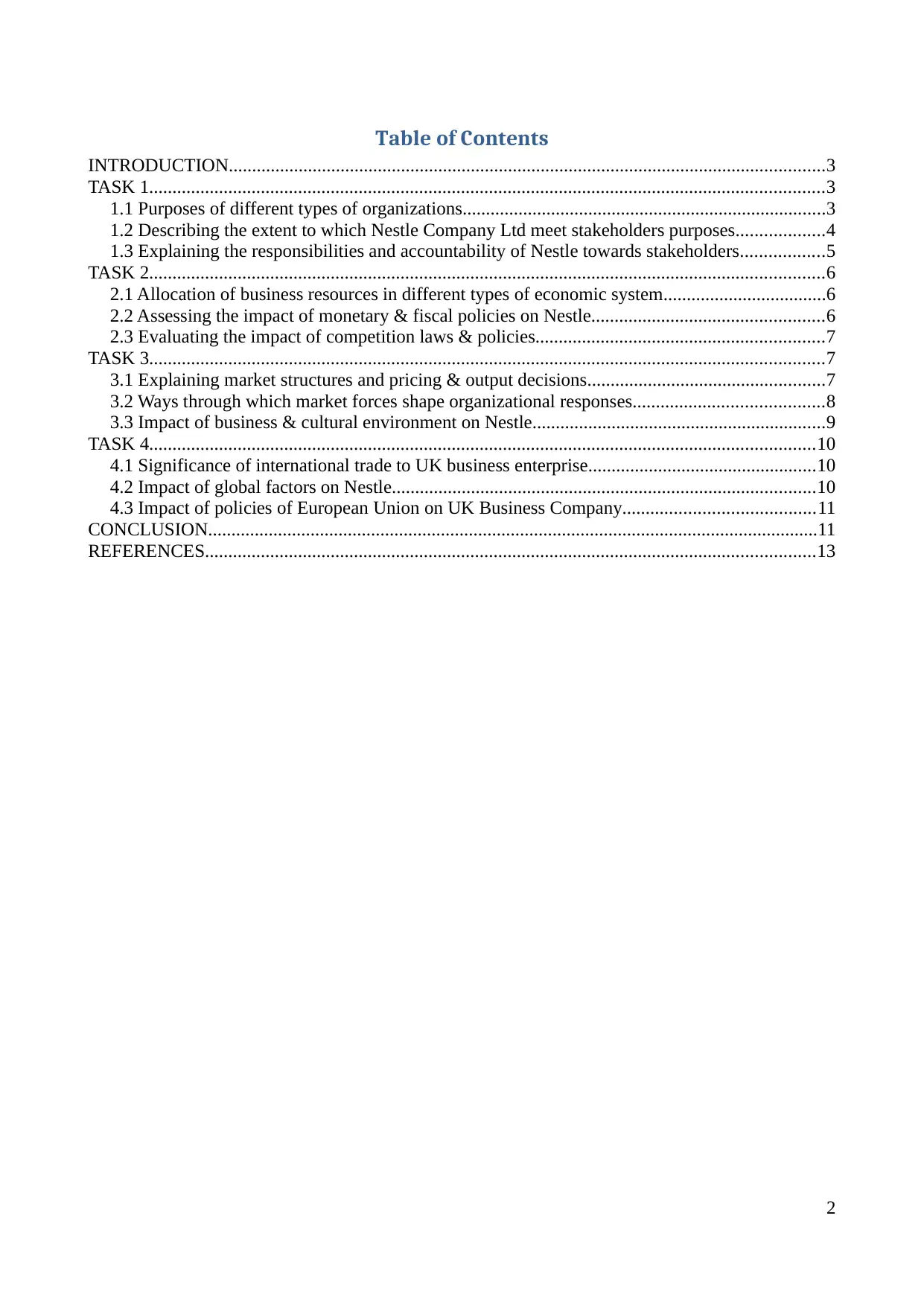
Table of Contents
INTRODUCTION................................................................................................................................3
TASK 1.................................................................................................................................................3
1.1 Purposes of different types of organizations..............................................................................3
1.2 Describing the extent to which Nestle Company Ltd meet stakeholders purposes...................4
1.3 Explaining the responsibilities and accountability of Nestle towards stakeholders..................5
TASK 2.................................................................................................................................................6
2.1 Allocation of business resources in different types of economic system...................................6
2.2 Assessing the impact of monetary & fiscal policies on Nestle..................................................6
2.3 Evaluating the impact of competition laws & policies..............................................................7
TASK 3.................................................................................................................................................7
3.1 Explaining market structures and pricing & output decisions...................................................7
3.2 Ways through which market forces shape organizational responses.........................................8
3.3 Impact of business & cultural environment on Nestle...............................................................9
TASK 4...............................................................................................................................................10
4.1 Significance of international trade to UK business enterprise.................................................10
4.2 Impact of global factors on Nestle...........................................................................................10
4.3 Impact of policies of European Union on UK Business Company.........................................11
CONCLUSION...................................................................................................................................11
REFERENCES...................................................................................................................................13
2
INTRODUCTION................................................................................................................................3
TASK 1.................................................................................................................................................3
1.1 Purposes of different types of organizations..............................................................................3
1.2 Describing the extent to which Nestle Company Ltd meet stakeholders purposes...................4
1.3 Explaining the responsibilities and accountability of Nestle towards stakeholders..................5
TASK 2.................................................................................................................................................6
2.1 Allocation of business resources in different types of economic system...................................6
2.2 Assessing the impact of monetary & fiscal policies on Nestle..................................................6
2.3 Evaluating the impact of competition laws & policies..............................................................7
TASK 3.................................................................................................................................................7
3.1 Explaining market structures and pricing & output decisions...................................................7
3.2 Ways through which market forces shape organizational responses.........................................8
3.3 Impact of business & cultural environment on Nestle...............................................................9
TASK 4...............................................................................................................................................10
4.1 Significance of international trade to UK business enterprise.................................................10
4.2 Impact of global factors on Nestle...........................................................................................10
4.3 Impact of policies of European Union on UK Business Company.........................................11
CONCLUSION...................................................................................................................................11
REFERENCES...................................................................................................................................13
2
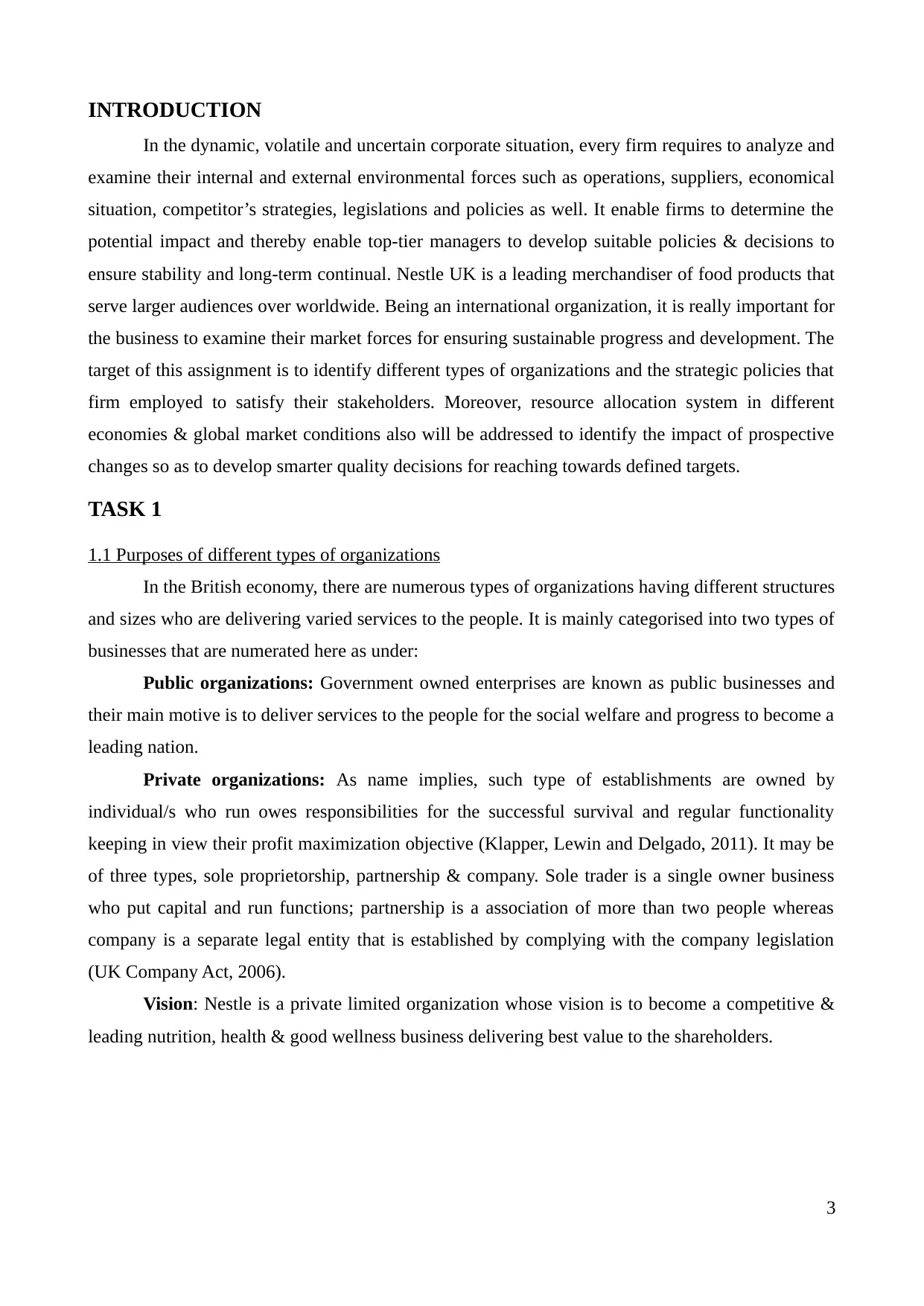
INTRODUCTION
In the dynamic, volatile and uncertain corporate situation, every firm requires to analyze and
examine their internal and external environmental forces such as operations, suppliers, economical
situation, competitor’s strategies, legislations and policies as well. It enable firms to determine the
potential impact and thereby enable top-tier managers to develop suitable policies & decisions to
ensure stability and long-term continual. Nestle UK is a leading merchandiser of food products that
serve larger audiences over worldwide. Being an international organization, it is really important for
the business to examine their market forces for ensuring sustainable progress and development. The
target of this assignment is to identify different types of organizations and the strategic policies that
firm employed to satisfy their stakeholders. Moreover, resource allocation system in different
economies & global market conditions also will be addressed to identify the impact of prospective
changes so as to develop smarter quality decisions for reaching towards defined targets.
TASK 1
1.1 Purposes of different types of organizations
In the British economy, there are numerous types of organizations having different structures
and sizes who are delivering varied services to the people. It is mainly categorised into two types of
businesses that are numerated here as under:
Public organizations: Government owned enterprises are known as public businesses and
their main motive is to deliver services to the people for the social welfare and progress to become a
leading nation.
Private organizations: As name implies, such type of establishments are owned by
individual/s who run owes responsibilities for the successful survival and regular functionality
keeping in view their profit maximization objective (Klapper, Lewin and Delgado, 2011). It may be
of three types, sole proprietorship, partnership & company. Sole trader is a single owner business
who put capital and run functions; partnership is a association of more than two people whereas
company is a separate legal entity that is established by complying with the company legislation
(UK Company Act, 2006).
Vision: Nestle is a private limited organization whose vision is to become a competitive &
leading nutrition, health & good wellness business delivering best value to the shareholders.
3
In the dynamic, volatile and uncertain corporate situation, every firm requires to analyze and
examine their internal and external environmental forces such as operations, suppliers, economical
situation, competitor’s strategies, legislations and policies as well. It enable firms to determine the
potential impact and thereby enable top-tier managers to develop suitable policies & decisions to
ensure stability and long-term continual. Nestle UK is a leading merchandiser of food products that
serve larger audiences over worldwide. Being an international organization, it is really important for
the business to examine their market forces for ensuring sustainable progress and development. The
target of this assignment is to identify different types of organizations and the strategic policies that
firm employed to satisfy their stakeholders. Moreover, resource allocation system in different
economies & global market conditions also will be addressed to identify the impact of prospective
changes so as to develop smarter quality decisions for reaching towards defined targets.
TASK 1
1.1 Purposes of different types of organizations
In the British economy, there are numerous types of organizations having different structures
and sizes who are delivering varied services to the people. It is mainly categorised into two types of
businesses that are numerated here as under:
Public organizations: Government owned enterprises are known as public businesses and
their main motive is to deliver services to the people for the social welfare and progress to become a
leading nation.
Private organizations: As name implies, such type of establishments are owned by
individual/s who run owes responsibilities for the successful survival and regular functionality
keeping in view their profit maximization objective (Klapper, Lewin and Delgado, 2011). It may be
of three types, sole proprietorship, partnership & company. Sole trader is a single owner business
who put capital and run functions; partnership is a association of more than two people whereas
company is a separate legal entity that is established by complying with the company legislation
(UK Company Act, 2006).
Vision: Nestle is a private limited organization whose vision is to become a competitive &
leading nutrition, health & good wellness business delivering best value to the shareholders.
3
⊘ This is a preview!⊘
Do you want full access?
Subscribe today to unlock all pages.

Trusted by 1+ million students worldwide
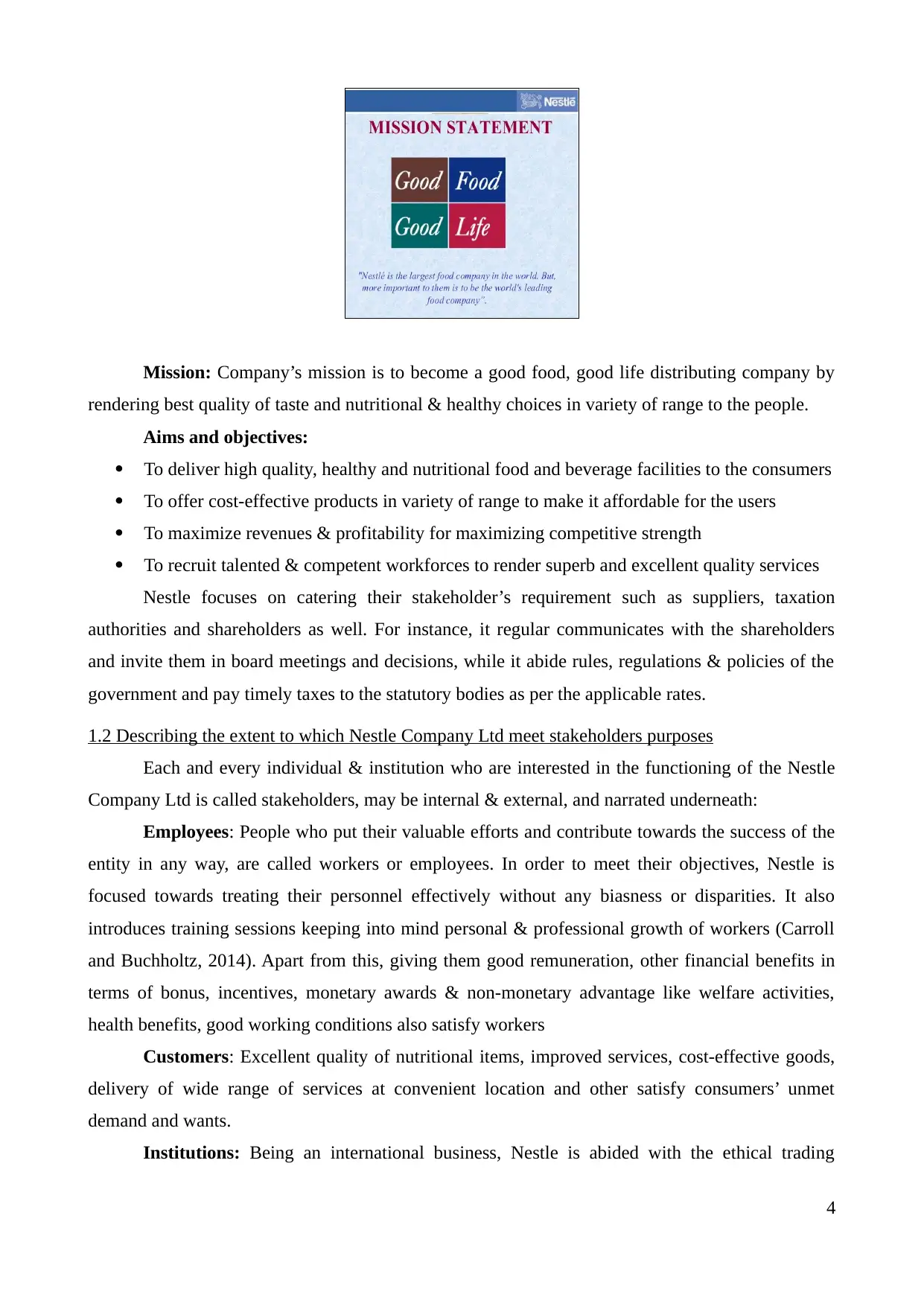
Mission: Company’s mission is to become a good food, good life distributing company by
rendering best quality of taste and nutritional & healthy choices in variety of range to the people.
Aims and objectives:
To deliver high quality, healthy and nutritional food and beverage facilities to the consumers
To offer cost-effective products in variety of range to make it affordable for the users
To maximize revenues & profitability for maximizing competitive strength
To recruit talented & competent workforces to render superb and excellent quality services
Nestle focuses on catering their stakeholder’s requirement such as suppliers, taxation
authorities and shareholders as well. For instance, it regular communicates with the shareholders
and invite them in board meetings and decisions, while it abide rules, regulations & policies of the
government and pay timely taxes to the statutory bodies as per the applicable rates.
1.2 Describing the extent to which Nestle Company Ltd meet stakeholders purposes
Each and every individual & institution who are interested in the functioning of the Nestle
Company Ltd is called stakeholders, may be internal & external, and narrated underneath:
Employees: People who put their valuable efforts and contribute towards the success of the
entity in any way, are called workers or employees. In order to meet their objectives, Nestle is
focused towards treating their personnel effectively without any biasness or disparities. It also
introduces training sessions keeping into mind personal & professional growth of workers (Carroll
and Buchholtz, 2014). Apart from this, giving them good remuneration, other financial benefits in
terms of bonus, incentives, monetary awards & non-monetary advantage like welfare activities,
health benefits, good working conditions also satisfy workers
Customers: Excellent quality of nutritional items, improved services, cost-effective goods,
delivery of wide range of services at convenient location and other satisfy consumers’ unmet
demand and wants.
Institutions: Being an international business, Nestle is abided with the ethical trading
4
rendering best quality of taste and nutritional & healthy choices in variety of range to the people.
Aims and objectives:
To deliver high quality, healthy and nutritional food and beverage facilities to the consumers
To offer cost-effective products in variety of range to make it affordable for the users
To maximize revenues & profitability for maximizing competitive strength
To recruit talented & competent workforces to render superb and excellent quality services
Nestle focuses on catering their stakeholder’s requirement such as suppliers, taxation
authorities and shareholders as well. For instance, it regular communicates with the shareholders
and invite them in board meetings and decisions, while it abide rules, regulations & policies of the
government and pay timely taxes to the statutory bodies as per the applicable rates.
1.2 Describing the extent to which Nestle Company Ltd meet stakeholders purposes
Each and every individual & institution who are interested in the functioning of the Nestle
Company Ltd is called stakeholders, may be internal & external, and narrated underneath:
Employees: People who put their valuable efforts and contribute towards the success of the
entity in any way, are called workers or employees. In order to meet their objectives, Nestle is
focused towards treating their personnel effectively without any biasness or disparities. It also
introduces training sessions keeping into mind personal & professional growth of workers (Carroll
and Buchholtz, 2014). Apart from this, giving them good remuneration, other financial benefits in
terms of bonus, incentives, monetary awards & non-monetary advantage like welfare activities,
health benefits, good working conditions also satisfy workers
Customers: Excellent quality of nutritional items, improved services, cost-effective goods,
delivery of wide range of services at convenient location and other satisfy consumers’ unmet
demand and wants.
Institutions: Being an international business, Nestle is abided with the ethical trading
4
Paraphrase This Document
Need a fresh take? Get an instant paraphrase of this document with our AI Paraphraser
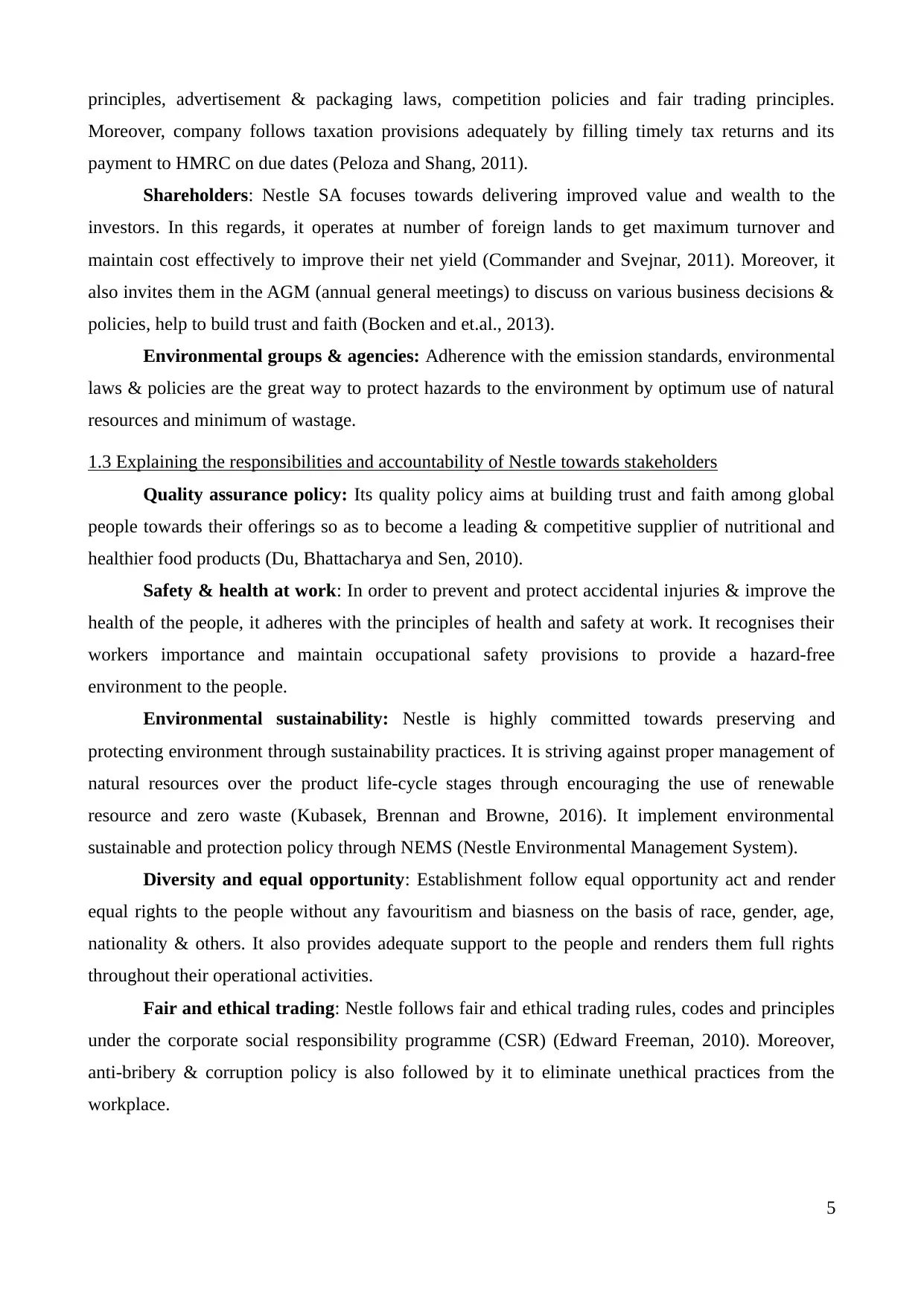
principles, advertisement & packaging laws, competition policies and fair trading principles.
Moreover, company follows taxation provisions adequately by filling timely tax returns and its
payment to HMRC on due dates (Peloza and Shang, 2011).
Shareholders: Nestle SA focuses towards delivering improved value and wealth to the
investors. In this regards, it operates at number of foreign lands to get maximum turnover and
maintain cost effectively to improve their net yield (Commander and Svejnar, 2011). Moreover, it
also invites them in the AGM (annual general meetings) to discuss on various business decisions &
policies, help to build trust and faith (Bocken and et.al., 2013).
Environmental groups & agencies: Adherence with the emission standards, environmental
laws & policies are the great way to protect hazards to the environment by optimum use of natural
resources and minimum of wastage.
1.3 Explaining the responsibilities and accountability of Nestle towards stakeholders
Quality assurance policy: Its quality policy aims at building trust and faith among global
people towards their offerings so as to become a leading & competitive supplier of nutritional and
healthier food products (Du, Bhattacharya and Sen, 2010).
Safety & health at work: In order to prevent and protect accidental injuries & improve the
health of the people, it adheres with the principles of health and safety at work. It recognises their
workers importance and maintain occupational safety provisions to provide a hazard-free
environment to the people.
Environmental sustainability: Nestle is highly committed towards preserving and
protecting environment through sustainability practices. It is striving against proper management of
natural resources over the product life-cycle stages through encouraging the use of renewable
resource and zero waste (Kubasek, Brennan and Browne, 2016). It implement environmental
sustainable and protection policy through NEMS (Nestle Environmental Management System).
Diversity and equal opportunity: Establishment follow equal opportunity act and render
equal rights to the people without any favouritism and biasness on the basis of race, gender, age,
nationality & others. It also provides adequate support to the people and renders them full rights
throughout their operational activities.
Fair and ethical trading: Nestle follows fair and ethical trading rules, codes and principles
under the corporate social responsibility programme (CSR) (Edward Freeman, 2010). Moreover,
anti-bribery & corruption policy is also followed by it to eliminate unethical practices from the
workplace.
5
Moreover, company follows taxation provisions adequately by filling timely tax returns and its
payment to HMRC on due dates (Peloza and Shang, 2011).
Shareholders: Nestle SA focuses towards delivering improved value and wealth to the
investors. In this regards, it operates at number of foreign lands to get maximum turnover and
maintain cost effectively to improve their net yield (Commander and Svejnar, 2011). Moreover, it
also invites them in the AGM (annual general meetings) to discuss on various business decisions &
policies, help to build trust and faith (Bocken and et.al., 2013).
Environmental groups & agencies: Adherence with the emission standards, environmental
laws & policies are the great way to protect hazards to the environment by optimum use of natural
resources and minimum of wastage.
1.3 Explaining the responsibilities and accountability of Nestle towards stakeholders
Quality assurance policy: Its quality policy aims at building trust and faith among global
people towards their offerings so as to become a leading & competitive supplier of nutritional and
healthier food products (Du, Bhattacharya and Sen, 2010).
Safety & health at work: In order to prevent and protect accidental injuries & improve the
health of the people, it adheres with the principles of health and safety at work. It recognises their
workers importance and maintain occupational safety provisions to provide a hazard-free
environment to the people.
Environmental sustainability: Nestle is highly committed towards preserving and
protecting environment through sustainability practices. It is striving against proper management of
natural resources over the product life-cycle stages through encouraging the use of renewable
resource and zero waste (Kubasek, Brennan and Browne, 2016). It implement environmental
sustainable and protection policy through NEMS (Nestle Environmental Management System).
Diversity and equal opportunity: Establishment follow equal opportunity act and render
equal rights to the people without any favouritism and biasness on the basis of race, gender, age,
nationality & others. It also provides adequate support to the people and renders them full rights
throughout their operational activities.
Fair and ethical trading: Nestle follows fair and ethical trading rules, codes and principles
under the corporate social responsibility programme (CSR) (Edward Freeman, 2010). Moreover,
anti-bribery & corruption policy is also followed by it to eliminate unethical practices from the
workplace.
5
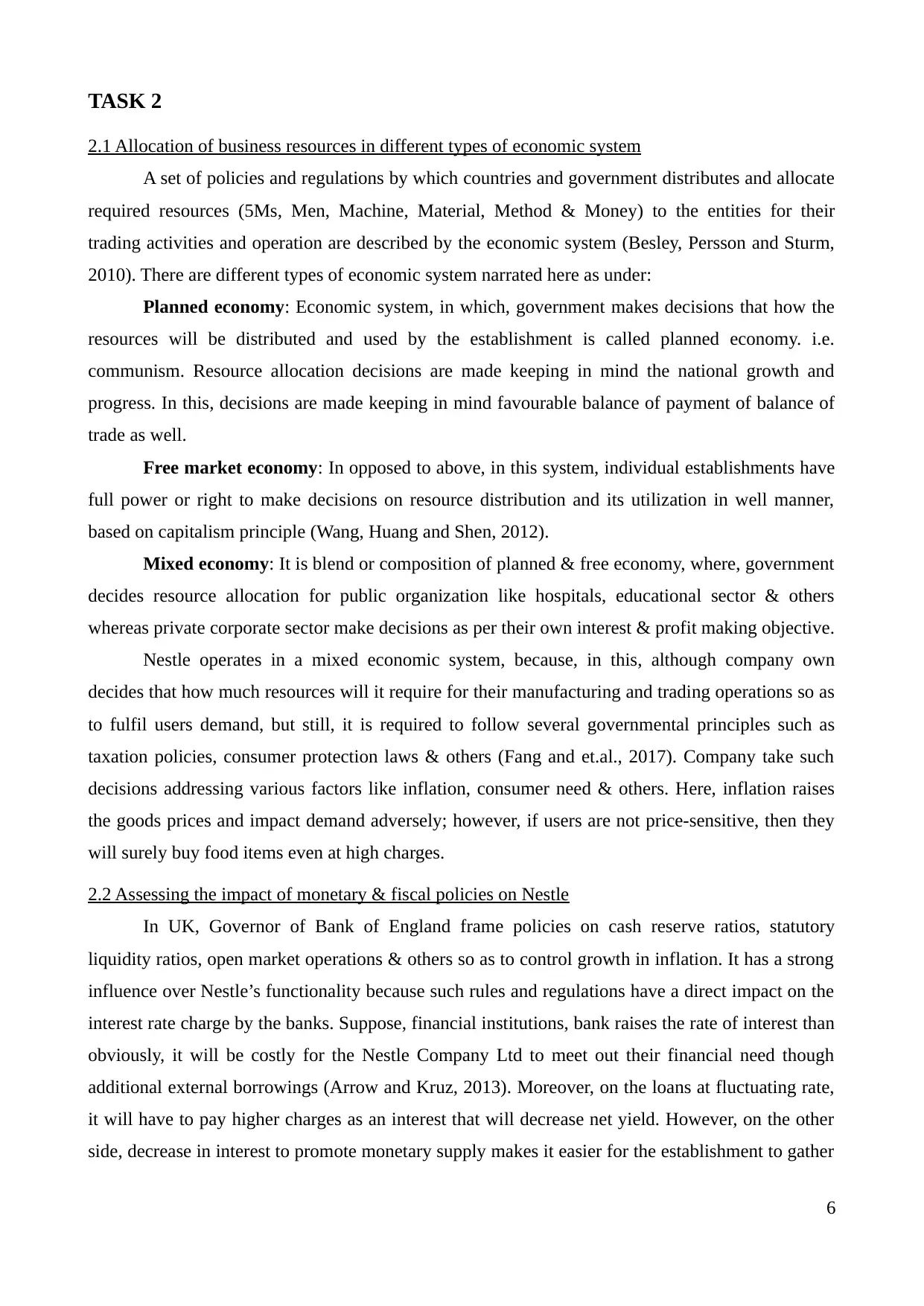
TASK 2
2.1 Allocation of business resources in different types of economic system
A set of policies and regulations by which countries and government distributes and allocate
required resources (5Ms, Men, Machine, Material, Method & Money) to the entities for their
trading activities and operation are described by the economic system (Besley, Persson and Sturm,
2010). There are different types of economic system narrated here as under:
Planned economy: Economic system, in which, government makes decisions that how the
resources will be distributed and used by the establishment is called planned economy. i.e.
communism. Resource allocation decisions are made keeping in mind the national growth and
progress. In this, decisions are made keeping in mind favourable balance of payment of balance of
trade as well.
Free market economy: In opposed to above, in this system, individual establishments have
full power or right to make decisions on resource distribution and its utilization in well manner,
based on capitalism principle (Wang, Huang and Shen, 2012).
Mixed economy: It is blend or composition of planned & free economy, where, government
decides resource allocation for public organization like hospitals, educational sector & others
whereas private corporate sector make decisions as per their own interest & profit making objective.
Nestle operates in a mixed economic system, because, in this, although company own
decides that how much resources will it require for their manufacturing and trading operations so as
to fulfil users demand, but still, it is required to follow several governmental principles such as
taxation policies, consumer protection laws & others (Fang and et.al., 2017). Company take such
decisions addressing various factors like inflation, consumer need & others. Here, inflation raises
the goods prices and impact demand adversely; however, if users are not price-sensitive, then they
will surely buy food items even at high charges.
2.2 Assessing the impact of monetary & fiscal policies on Nestle
In UK, Governor of Bank of England frame policies on cash reserve ratios, statutory
liquidity ratios, open market operations & others so as to control growth in inflation. It has a strong
influence over Nestle’s functionality because such rules and regulations have a direct impact on the
interest rate charge by the banks. Suppose, financial institutions, bank raises the rate of interest than
obviously, it will be costly for the Nestle Company Ltd to meet out their financial need though
additional external borrowings (Arrow and Kruz, 2013). Moreover, on the loans at fluctuating rate,
it will have to pay higher charges as an interest that will decrease net yield. However, on the other
side, decrease in interest to promote monetary supply makes it easier for the establishment to gather
6
2.1 Allocation of business resources in different types of economic system
A set of policies and regulations by which countries and government distributes and allocate
required resources (5Ms, Men, Machine, Material, Method & Money) to the entities for their
trading activities and operation are described by the economic system (Besley, Persson and Sturm,
2010). There are different types of economic system narrated here as under:
Planned economy: Economic system, in which, government makes decisions that how the
resources will be distributed and used by the establishment is called planned economy. i.e.
communism. Resource allocation decisions are made keeping in mind the national growth and
progress. In this, decisions are made keeping in mind favourable balance of payment of balance of
trade as well.
Free market economy: In opposed to above, in this system, individual establishments have
full power or right to make decisions on resource distribution and its utilization in well manner,
based on capitalism principle (Wang, Huang and Shen, 2012).
Mixed economy: It is blend or composition of planned & free economy, where, government
decides resource allocation for public organization like hospitals, educational sector & others
whereas private corporate sector make decisions as per their own interest & profit making objective.
Nestle operates in a mixed economic system, because, in this, although company own
decides that how much resources will it require for their manufacturing and trading operations so as
to fulfil users demand, but still, it is required to follow several governmental principles such as
taxation policies, consumer protection laws & others (Fang and et.al., 2017). Company take such
decisions addressing various factors like inflation, consumer need & others. Here, inflation raises
the goods prices and impact demand adversely; however, if users are not price-sensitive, then they
will surely buy food items even at high charges.
2.2 Assessing the impact of monetary & fiscal policies on Nestle
In UK, Governor of Bank of England frame policies on cash reserve ratios, statutory
liquidity ratios, open market operations & others so as to control growth in inflation. It has a strong
influence over Nestle’s functionality because such rules and regulations have a direct impact on the
interest rate charge by the banks. Suppose, financial institutions, bank raises the rate of interest than
obviously, it will be costly for the Nestle Company Ltd to meet out their financial need though
additional external borrowings (Arrow and Kruz, 2013). Moreover, on the loans at fluctuating rate,
it will have to pay higher charges as an interest that will decrease net yield. However, on the other
side, decrease in interest to promote monetary supply makes it easier for the establishment to gather
6
⊘ This is a preview!⊘
Do you want full access?
Subscribe today to unlock all pages.

Trusted by 1+ million students worldwide
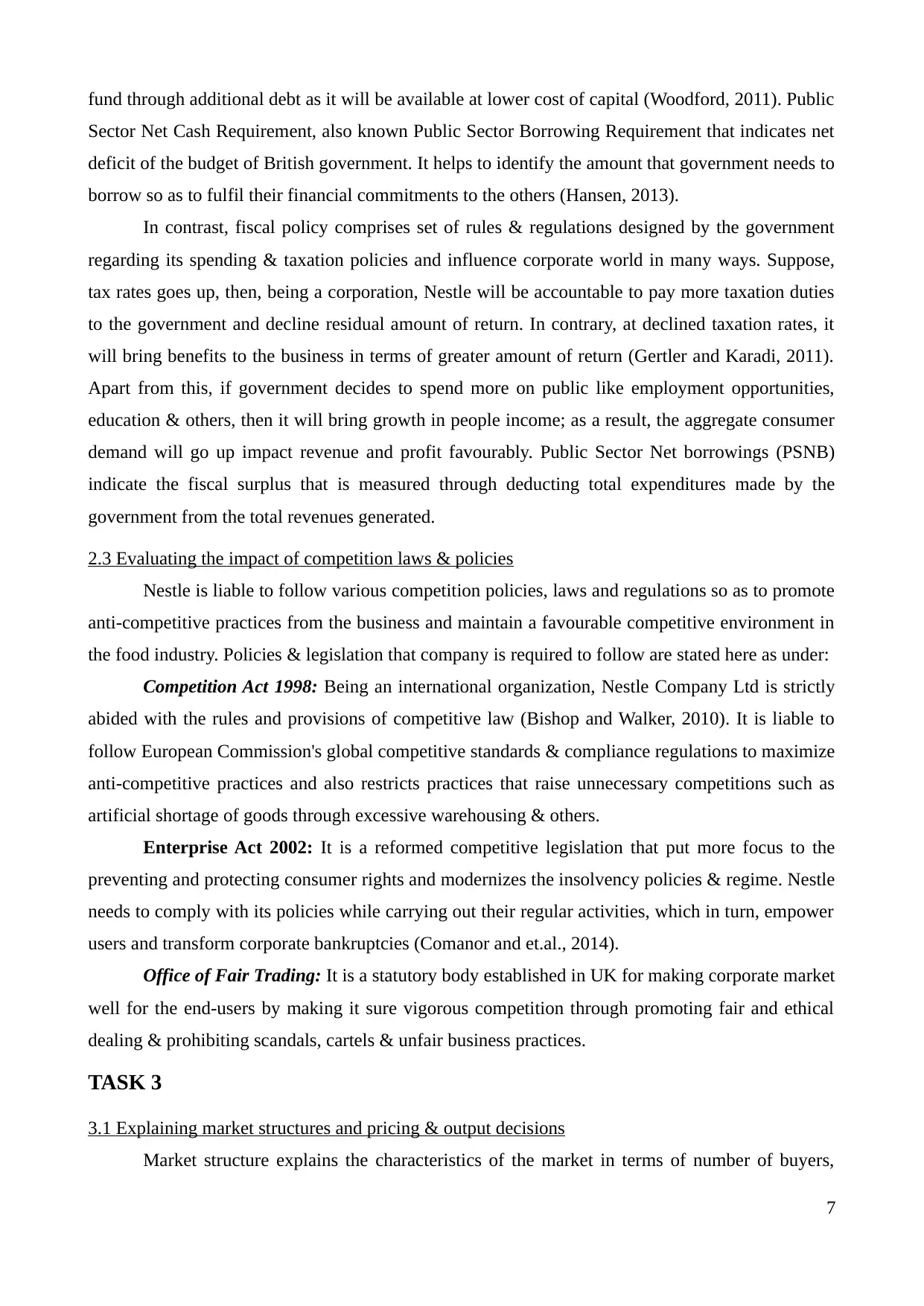
fund through additional debt as it will be available at lower cost of capital (Woodford, 2011). Public
Sector Net Cash Requirement, also known Public Sector Borrowing Requirement that indicates net
deficit of the budget of British government. It helps to identify the amount that government needs to
borrow so as to fulfil their financial commitments to the others (Hansen, 2013).
In contrast, fiscal policy comprises set of rules & regulations designed by the government
regarding its spending & taxation policies and influence corporate world in many ways. Suppose,
tax rates goes up, then, being a corporation, Nestle will be accountable to pay more taxation duties
to the government and decline residual amount of return. In contrary, at declined taxation rates, it
will bring benefits to the business in terms of greater amount of return (Gertler and Karadi, 2011).
Apart from this, if government decides to spend more on public like employment opportunities,
education & others, then it will bring growth in people income; as a result, the aggregate consumer
demand will go up impact revenue and profit favourably. Public Sector Net borrowings (PSNB)
indicate the fiscal surplus that is measured through deducting total expenditures made by the
government from the total revenues generated.
2.3 Evaluating the impact of competition laws & policies
Nestle is liable to follow various competition policies, laws and regulations so as to promote
anti-competitive practices from the business and maintain a favourable competitive environment in
the food industry. Policies & legislation that company is required to follow are stated here as under:
Competition Act 1998: Being an international organization, Nestle Company Ltd is strictly
abided with the rules and provisions of competitive law (Bishop and Walker, 2010). It is liable to
follow European Commission's global competitive standards & compliance regulations to maximize
anti-competitive practices and also restricts practices that raise unnecessary competitions such as
artificial shortage of goods through excessive warehousing & others.
Enterprise Act 2002: It is a reformed competitive legislation that put more focus to the
preventing and protecting consumer rights and modernizes the insolvency policies & regime. Nestle
needs to comply with its policies while carrying out their regular activities, which in turn, empower
users and transform corporate bankruptcies (Comanor and et.al., 2014).
Office of Fair Trading: It is a statutory body established in UK for making corporate market
well for the end-users by making it sure vigorous competition through promoting fair and ethical
dealing & prohibiting scandals, cartels & unfair business practices.
TASK 3
3.1 Explaining market structures and pricing & output decisions
Market structure explains the characteristics of the market in terms of number of buyers,
7
Sector Net Cash Requirement, also known Public Sector Borrowing Requirement that indicates net
deficit of the budget of British government. It helps to identify the amount that government needs to
borrow so as to fulfil their financial commitments to the others (Hansen, 2013).
In contrast, fiscal policy comprises set of rules & regulations designed by the government
regarding its spending & taxation policies and influence corporate world in many ways. Suppose,
tax rates goes up, then, being a corporation, Nestle will be accountable to pay more taxation duties
to the government and decline residual amount of return. In contrary, at declined taxation rates, it
will bring benefits to the business in terms of greater amount of return (Gertler and Karadi, 2011).
Apart from this, if government decides to spend more on public like employment opportunities,
education & others, then it will bring growth in people income; as a result, the aggregate consumer
demand will go up impact revenue and profit favourably. Public Sector Net borrowings (PSNB)
indicate the fiscal surplus that is measured through deducting total expenditures made by the
government from the total revenues generated.
2.3 Evaluating the impact of competition laws & policies
Nestle is liable to follow various competition policies, laws and regulations so as to promote
anti-competitive practices from the business and maintain a favourable competitive environment in
the food industry. Policies & legislation that company is required to follow are stated here as under:
Competition Act 1998: Being an international organization, Nestle Company Ltd is strictly
abided with the rules and provisions of competitive law (Bishop and Walker, 2010). It is liable to
follow European Commission's global competitive standards & compliance regulations to maximize
anti-competitive practices and also restricts practices that raise unnecessary competitions such as
artificial shortage of goods through excessive warehousing & others.
Enterprise Act 2002: It is a reformed competitive legislation that put more focus to the
preventing and protecting consumer rights and modernizes the insolvency policies & regime. Nestle
needs to comply with its policies while carrying out their regular activities, which in turn, empower
users and transform corporate bankruptcies (Comanor and et.al., 2014).
Office of Fair Trading: It is a statutory body established in UK for making corporate market
well for the end-users by making it sure vigorous competition through promoting fair and ethical
dealing & prohibiting scandals, cartels & unfair business practices.
TASK 3
3.1 Explaining market structures and pricing & output decisions
Market structure explains the characteristics of the market in terms of number of buyers,
7
Paraphrase This Document
Need a fresh take? Get an instant paraphrase of this document with our AI Paraphraser
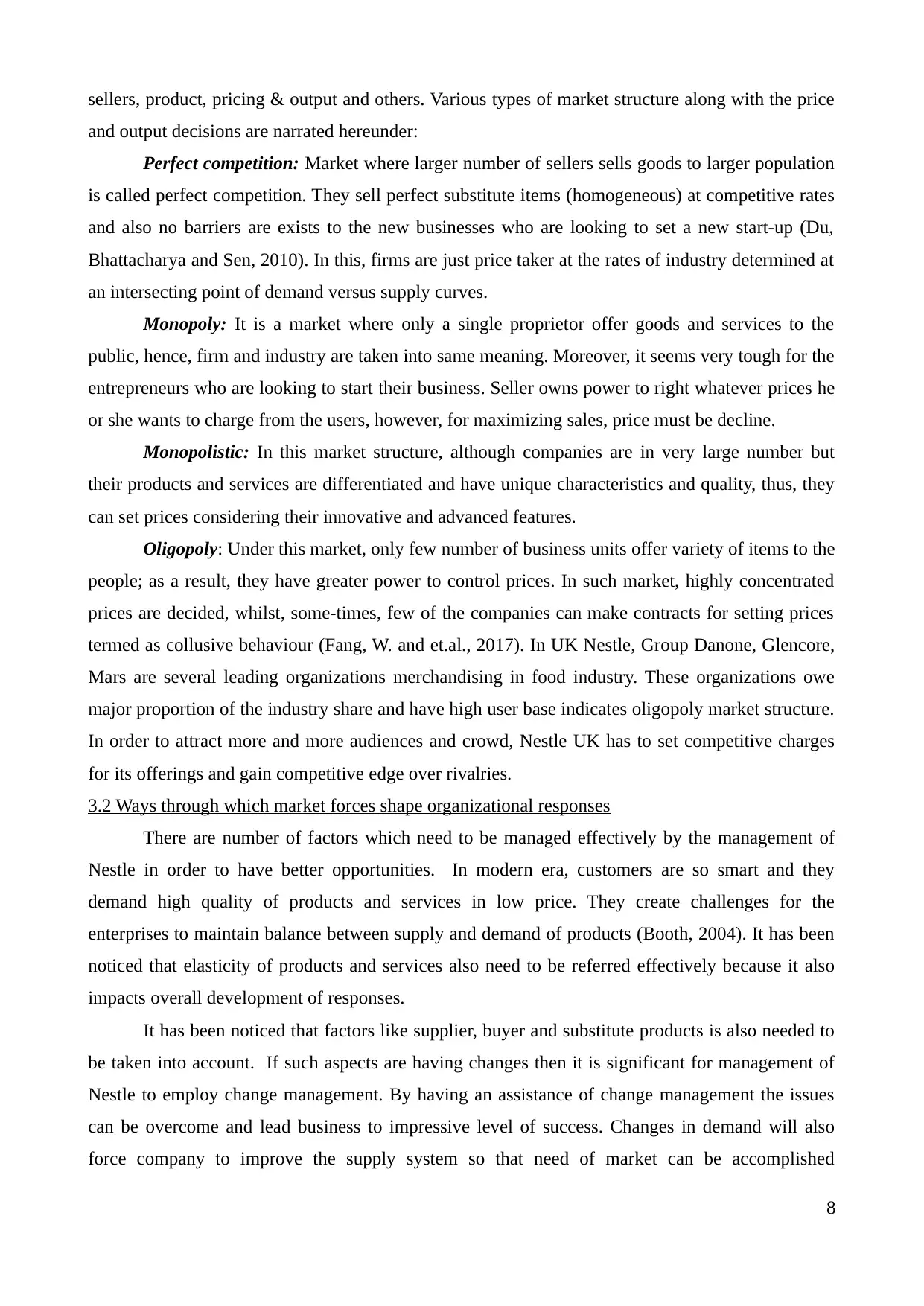
sellers, product, pricing & output and others. Various types of market structure along with the price
and output decisions are narrated hereunder:
Perfect competition: Market where larger number of sellers sells goods to larger population
is called perfect competition. They sell perfect substitute items (homogeneous) at competitive rates
and also no barriers are exists to the new businesses who are looking to set a new start-up (Du,
Bhattacharya and Sen, 2010). In this, firms are just price taker at the rates of industry determined at
an intersecting point of demand versus supply curves.
Monopoly: It is a market where only a single proprietor offer goods and services to the
public, hence, firm and industry are taken into same meaning. Moreover, it seems very tough for the
entrepreneurs who are looking to start their business. Seller owns power to right whatever prices he
or she wants to charge from the users, however, for maximizing sales, price must be decline.
Monopolistic: In this market structure, although companies are in very large number but
their products and services are differentiated and have unique characteristics and quality, thus, they
can set prices considering their innovative and advanced features.
Oligopoly: Under this market, only few number of business units offer variety of items to the
people; as a result, they have greater power to control prices. In such market, highly concentrated
prices are decided, whilst, some-times, few of the companies can make contracts for setting prices
termed as collusive behaviour (Fang, W. and et.al., 2017). In UK Nestle, Group Danone, Glencore,
Mars are several leading organizations merchandising in food industry. These organizations owe
major proportion of the industry share and have high user base indicates oligopoly market structure.
In order to attract more and more audiences and crowd, Nestle UK has to set competitive charges
for its offerings and gain competitive edge over rivalries.
3.2 Ways through which market forces shape organizational responses
There are number of factors which need to be managed effectively by the management of
Nestle in order to have better opportunities. In modern era, customers are so smart and they
demand high quality of products and services in low price. They create challenges for the
enterprises to maintain balance between supply and demand of products (Booth, 2004). It has been
noticed that elasticity of products and services also need to be referred effectively because it also
impacts overall development of responses.
It has been noticed that factors like supplier, buyer and substitute products is also needed to
be taken into account. If such aspects are having changes then it is significant for management of
Nestle to employ change management. By having an assistance of change management the issues
can be overcome and lead business to impressive level of success. Changes in demand will also
force company to improve the supply system so that need of market can be accomplished
8
and output decisions are narrated hereunder:
Perfect competition: Market where larger number of sellers sells goods to larger population
is called perfect competition. They sell perfect substitute items (homogeneous) at competitive rates
and also no barriers are exists to the new businesses who are looking to set a new start-up (Du,
Bhattacharya and Sen, 2010). In this, firms are just price taker at the rates of industry determined at
an intersecting point of demand versus supply curves.
Monopoly: It is a market where only a single proprietor offer goods and services to the
public, hence, firm and industry are taken into same meaning. Moreover, it seems very tough for the
entrepreneurs who are looking to start their business. Seller owns power to right whatever prices he
or she wants to charge from the users, however, for maximizing sales, price must be decline.
Monopolistic: In this market structure, although companies are in very large number but
their products and services are differentiated and have unique characteristics and quality, thus, they
can set prices considering their innovative and advanced features.
Oligopoly: Under this market, only few number of business units offer variety of items to the
people; as a result, they have greater power to control prices. In such market, highly concentrated
prices are decided, whilst, some-times, few of the companies can make contracts for setting prices
termed as collusive behaviour (Fang, W. and et.al., 2017). In UK Nestle, Group Danone, Glencore,
Mars are several leading organizations merchandising in food industry. These organizations owe
major proportion of the industry share and have high user base indicates oligopoly market structure.
In order to attract more and more audiences and crowd, Nestle UK has to set competitive charges
for its offerings and gain competitive edge over rivalries.
3.2 Ways through which market forces shape organizational responses
There are number of factors which need to be managed effectively by the management of
Nestle in order to have better opportunities. In modern era, customers are so smart and they
demand high quality of products and services in low price. They create challenges for the
enterprises to maintain balance between supply and demand of products (Booth, 2004). It has been
noticed that elasticity of products and services also need to be referred effectively because it also
impacts overall development of responses.
It has been noticed that factors like supplier, buyer and substitute products is also needed to
be taken into account. If such aspects are having changes then it is significant for management of
Nestle to employ change management. By having an assistance of change management the issues
can be overcome and lead business to impressive level of success. Changes in demand will also
force company to improve the supply system so that need of market can be accomplished
8
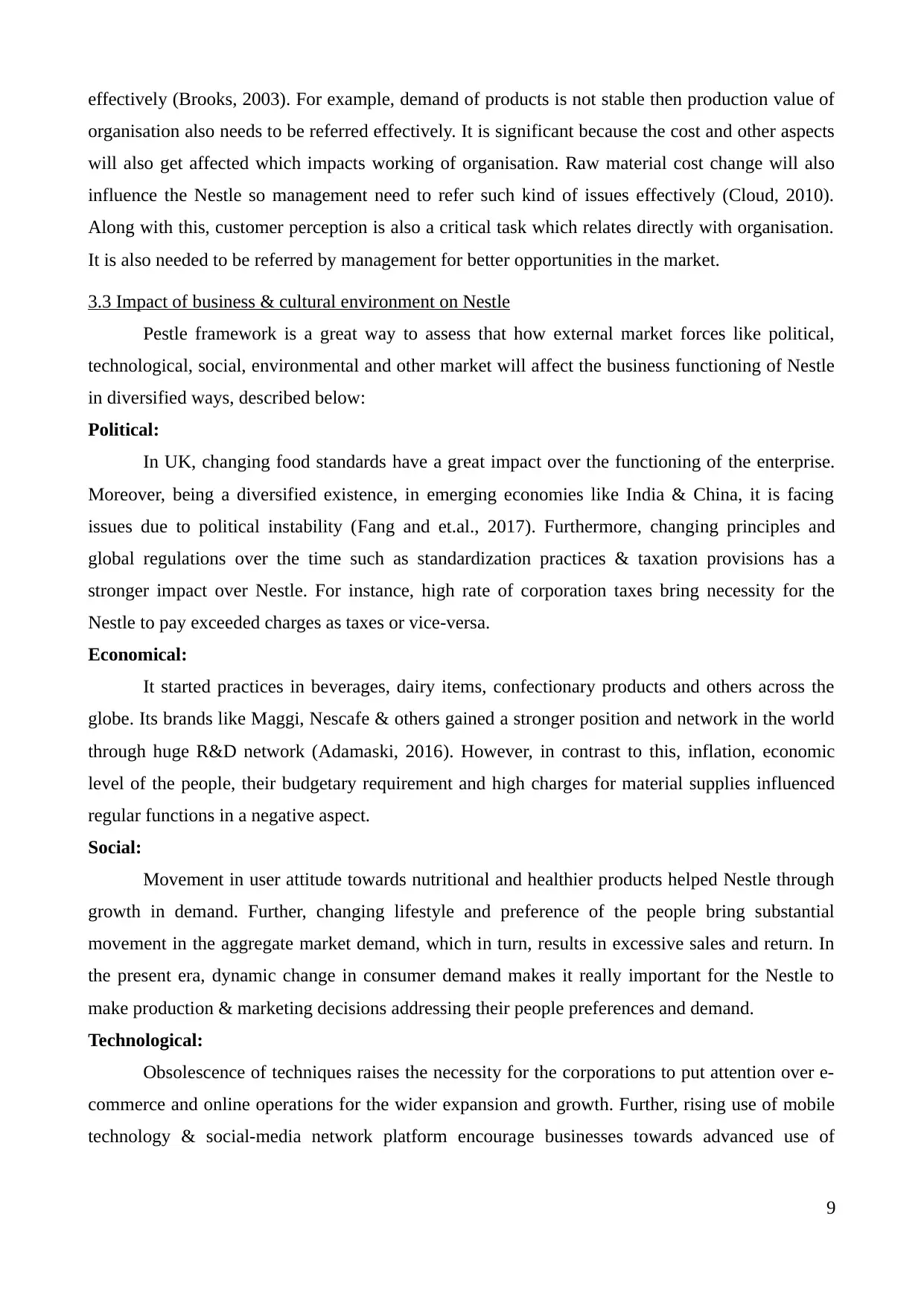
effectively (Brooks, 2003). For example, demand of products is not stable then production value of
organisation also needs to be referred effectively. It is significant because the cost and other aspects
will also get affected which impacts working of organisation. Raw material cost change will also
influence the Nestle so management need to refer such kind of issues effectively (Cloud, 2010).
Along with this, customer perception is also a critical task which relates directly with organisation.
It is also needed to be referred by management for better opportunities in the market.
3.3 Impact of business & cultural environment on Nestle
Pestle framework is a great way to assess that how external market forces like political,
technological, social, environmental and other market will affect the business functioning of Nestle
in diversified ways, described below:
Political:
In UK, changing food standards have a great impact over the functioning of the enterprise.
Moreover, being a diversified existence, in emerging economies like India & China, it is facing
issues due to political instability (Fang and et.al., 2017). Furthermore, changing principles and
global regulations over the time such as standardization practices & taxation provisions has a
stronger impact over Nestle. For instance, high rate of corporation taxes bring necessity for the
Nestle to pay exceeded charges as taxes or vice-versa.
Economical:
It started practices in beverages, dairy items, confectionary products and others across the
globe. Its brands like Maggi, Nescafe & others gained a stronger position and network in the world
through huge R&D network (Adamaski, 2016). However, in contrast to this, inflation, economic
level of the people, their budgetary requirement and high charges for material supplies influenced
regular functions in a negative aspect.
Social:
Movement in user attitude towards nutritional and healthier products helped Nestle through
growth in demand. Further, changing lifestyle and preference of the people bring substantial
movement in the aggregate market demand, which in turn, results in excessive sales and return. In
the present era, dynamic change in consumer demand makes it really important for the Nestle to
make production & marketing decisions addressing their people preferences and demand.
Technological:
Obsolescence of techniques raises the necessity for the corporations to put attention over e-
commerce and online operations for the wider expansion and growth. Further, rising use of mobile
technology & social-media network platform encourage businesses towards advanced use of
9
organisation also needs to be referred effectively. It is significant because the cost and other aspects
will also get affected which impacts working of organisation. Raw material cost change will also
influence the Nestle so management need to refer such kind of issues effectively (Cloud, 2010).
Along with this, customer perception is also a critical task which relates directly with organisation.
It is also needed to be referred by management for better opportunities in the market.
3.3 Impact of business & cultural environment on Nestle
Pestle framework is a great way to assess that how external market forces like political,
technological, social, environmental and other market will affect the business functioning of Nestle
in diversified ways, described below:
Political:
In UK, changing food standards have a great impact over the functioning of the enterprise.
Moreover, being a diversified existence, in emerging economies like India & China, it is facing
issues due to political instability (Fang and et.al., 2017). Furthermore, changing principles and
global regulations over the time such as standardization practices & taxation provisions has a
stronger impact over Nestle. For instance, high rate of corporation taxes bring necessity for the
Nestle to pay exceeded charges as taxes or vice-versa.
Economical:
It started practices in beverages, dairy items, confectionary products and others across the
globe. Its brands like Maggi, Nescafe & others gained a stronger position and network in the world
through huge R&D network (Adamaski, 2016). However, in contrast to this, inflation, economic
level of the people, their budgetary requirement and high charges for material supplies influenced
regular functions in a negative aspect.
Social:
Movement in user attitude towards nutritional and healthier products helped Nestle through
growth in demand. Further, changing lifestyle and preference of the people bring substantial
movement in the aggregate market demand, which in turn, results in excessive sales and return. In
the present era, dynamic change in consumer demand makes it really important for the Nestle to
make production & marketing decisions addressing their people preferences and demand.
Technological:
Obsolescence of techniques raises the necessity for the corporations to put attention over e-
commerce and online operations for the wider expansion and growth. Further, rising use of mobile
technology & social-media network platform encourage businesses towards advanced use of
9
⊘ This is a preview!⊘
Do you want full access?
Subscribe today to unlock all pages.

Trusted by 1+ million students worldwide
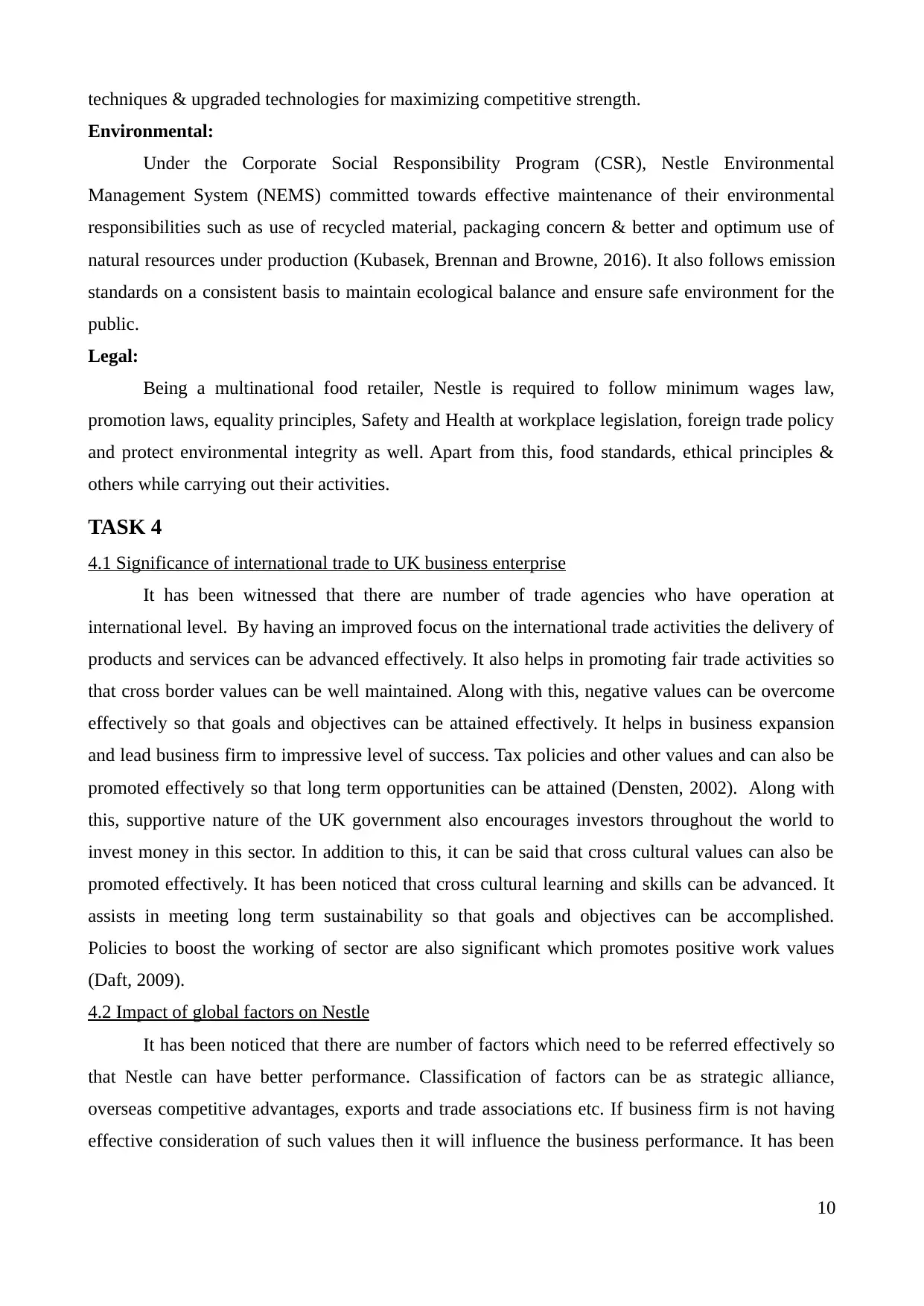
techniques & upgraded technologies for maximizing competitive strength.
Environmental:
Under the Corporate Social Responsibility Program (CSR), Nestle Environmental
Management System (NEMS) committed towards effective maintenance of their environmental
responsibilities such as use of recycled material, packaging concern & better and optimum use of
natural resources under production (Kubasek, Brennan and Browne, 2016). It also follows emission
standards on a consistent basis to maintain ecological balance and ensure safe environment for the
public.
Legal:
Being a multinational food retailer, Nestle is required to follow minimum wages law,
promotion laws, equality principles, Safety and Health at workplace legislation, foreign trade policy
and protect environmental integrity as well. Apart from this, food standards, ethical principles &
others while carrying out their activities.
TASK 4
4.1 Significance of international trade to UK business enterprise
It has been witnessed that there are number of trade agencies who have operation at
international level. By having an improved focus on the international trade activities the delivery of
products and services can be advanced effectively. It also helps in promoting fair trade activities so
that cross border values can be well maintained. Along with this, negative values can be overcome
effectively so that goals and objectives can be attained effectively. It helps in business expansion
and lead business firm to impressive level of success. Tax policies and other values and can also be
promoted effectively so that long term opportunities can be attained (Densten, 2002). Along with
this, supportive nature of the UK government also encourages investors throughout the world to
invest money in this sector. In addition to this, it can be said that cross cultural values can also be
promoted effectively. It has been noticed that cross cultural learning and skills can be advanced. It
assists in meeting long term sustainability so that goals and objectives can be accomplished.
Policies to boost the working of sector are also significant which promotes positive work values
(Daft, 2009).
4.2 Impact of global factors on Nestle
It has been noticed that there are number of factors which need to be referred effectively so
that Nestle can have better performance. Classification of factors can be as strategic alliance,
overseas competitive advantages, exports and trade associations etc. If business firm is not having
effective consideration of such values then it will influence the business performance. It has been
10
Environmental:
Under the Corporate Social Responsibility Program (CSR), Nestle Environmental
Management System (NEMS) committed towards effective maintenance of their environmental
responsibilities such as use of recycled material, packaging concern & better and optimum use of
natural resources under production (Kubasek, Brennan and Browne, 2016). It also follows emission
standards on a consistent basis to maintain ecological balance and ensure safe environment for the
public.
Legal:
Being a multinational food retailer, Nestle is required to follow minimum wages law,
promotion laws, equality principles, Safety and Health at workplace legislation, foreign trade policy
and protect environmental integrity as well. Apart from this, food standards, ethical principles &
others while carrying out their activities.
TASK 4
4.1 Significance of international trade to UK business enterprise
It has been witnessed that there are number of trade agencies who have operation at
international level. By having an improved focus on the international trade activities the delivery of
products and services can be advanced effectively. It also helps in promoting fair trade activities so
that cross border values can be well maintained. Along with this, negative values can be overcome
effectively so that goals and objectives can be attained effectively. It helps in business expansion
and lead business firm to impressive level of success. Tax policies and other values and can also be
promoted effectively so that long term opportunities can be attained (Densten, 2002). Along with
this, supportive nature of the UK government also encourages investors throughout the world to
invest money in this sector. In addition to this, it can be said that cross cultural values can also be
promoted effectively. It has been noticed that cross cultural learning and skills can be advanced. It
assists in meeting long term sustainability so that goals and objectives can be accomplished.
Policies to boost the working of sector are also significant which promotes positive work values
(Daft, 2009).
4.2 Impact of global factors on Nestle
It has been noticed that there are number of factors which need to be referred effectively so
that Nestle can have better performance. Classification of factors can be as strategic alliance,
overseas competitive advantages, exports and trade associations etc. If business firm is not having
effective consideration of such values then it will influence the business performance. It has been
10
Paraphrase This Document
Need a fresh take? Get an instant paraphrase of this document with our AI Paraphraser
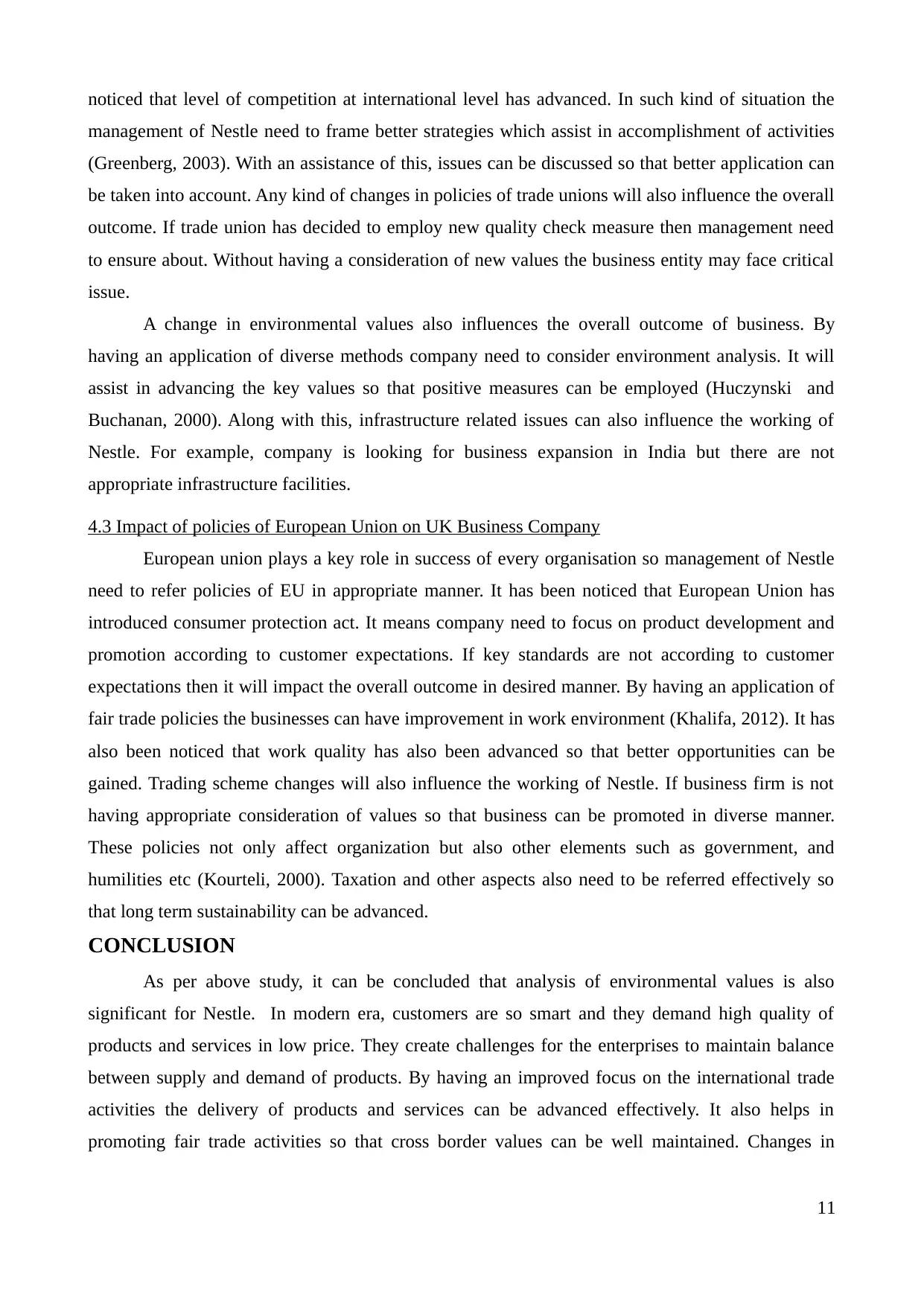
noticed that level of competition at international level has advanced. In such kind of situation the
management of Nestle need to frame better strategies which assist in accomplishment of activities
(Greenberg, 2003). With an assistance of this, issues can be discussed so that better application can
be taken into account. Any kind of changes in policies of trade unions will also influence the overall
outcome. If trade union has decided to employ new quality check measure then management need
to ensure about. Without having a consideration of new values the business entity may face critical
issue.
A change in environmental values also influences the overall outcome of business. By
having an application of diverse methods company need to consider environment analysis. It will
assist in advancing the key values so that positive measures can be employed (Huczynski and
Buchanan, 2000). Along with this, infrastructure related issues can also influence the working of
Nestle. For example, company is looking for business expansion in India but there are not
appropriate infrastructure facilities.
4.3 Impact of policies of European Union on UK Business Company
European union plays a key role in success of every organisation so management of Nestle
need to refer policies of EU in appropriate manner. It has been noticed that European Union has
introduced consumer protection act. It means company need to focus on product development and
promotion according to customer expectations. If key standards are not according to customer
expectations then it will impact the overall outcome in desired manner. By having an application of
fair trade policies the businesses can have improvement in work environment (Khalifa, 2012). It has
also been noticed that work quality has also been advanced so that better opportunities can be
gained. Trading scheme changes will also influence the working of Nestle. If business firm is not
having appropriate consideration of values so that business can be promoted in diverse manner.
These policies not only affect organization but also other elements such as government, and
humilities etc (Kourteli, 2000). Taxation and other aspects also need to be referred effectively so
that long term sustainability can be advanced.
CONCLUSION
As per above study, it can be concluded that analysis of environmental values is also
significant for Nestle. In modern era, customers are so smart and they demand high quality of
products and services in low price. They create challenges for the enterprises to maintain balance
between supply and demand of products. By having an improved focus on the international trade
activities the delivery of products and services can be advanced effectively. It also helps in
promoting fair trade activities so that cross border values can be well maintained. Changes in
11
management of Nestle need to frame better strategies which assist in accomplishment of activities
(Greenberg, 2003). With an assistance of this, issues can be discussed so that better application can
be taken into account. Any kind of changes in policies of trade unions will also influence the overall
outcome. If trade union has decided to employ new quality check measure then management need
to ensure about. Without having a consideration of new values the business entity may face critical
issue.
A change in environmental values also influences the overall outcome of business. By
having an application of diverse methods company need to consider environment analysis. It will
assist in advancing the key values so that positive measures can be employed (Huczynski and
Buchanan, 2000). Along with this, infrastructure related issues can also influence the working of
Nestle. For example, company is looking for business expansion in India but there are not
appropriate infrastructure facilities.
4.3 Impact of policies of European Union on UK Business Company
European union plays a key role in success of every organisation so management of Nestle
need to refer policies of EU in appropriate manner. It has been noticed that European Union has
introduced consumer protection act. It means company need to focus on product development and
promotion according to customer expectations. If key standards are not according to customer
expectations then it will impact the overall outcome in desired manner. By having an application of
fair trade policies the businesses can have improvement in work environment (Khalifa, 2012). It has
also been noticed that work quality has also been advanced so that better opportunities can be
gained. Trading scheme changes will also influence the working of Nestle. If business firm is not
having appropriate consideration of values so that business can be promoted in diverse manner.
These policies not only affect organization but also other elements such as government, and
humilities etc (Kourteli, 2000). Taxation and other aspects also need to be referred effectively so
that long term sustainability can be advanced.
CONCLUSION
As per above study, it can be concluded that analysis of environmental values is also
significant for Nestle. In modern era, customers are so smart and they demand high quality of
products and services in low price. They create challenges for the enterprises to maintain balance
between supply and demand of products. By having an improved focus on the international trade
activities the delivery of products and services can be advanced effectively. It also helps in
promoting fair trade activities so that cross border values can be well maintained. Changes in
11
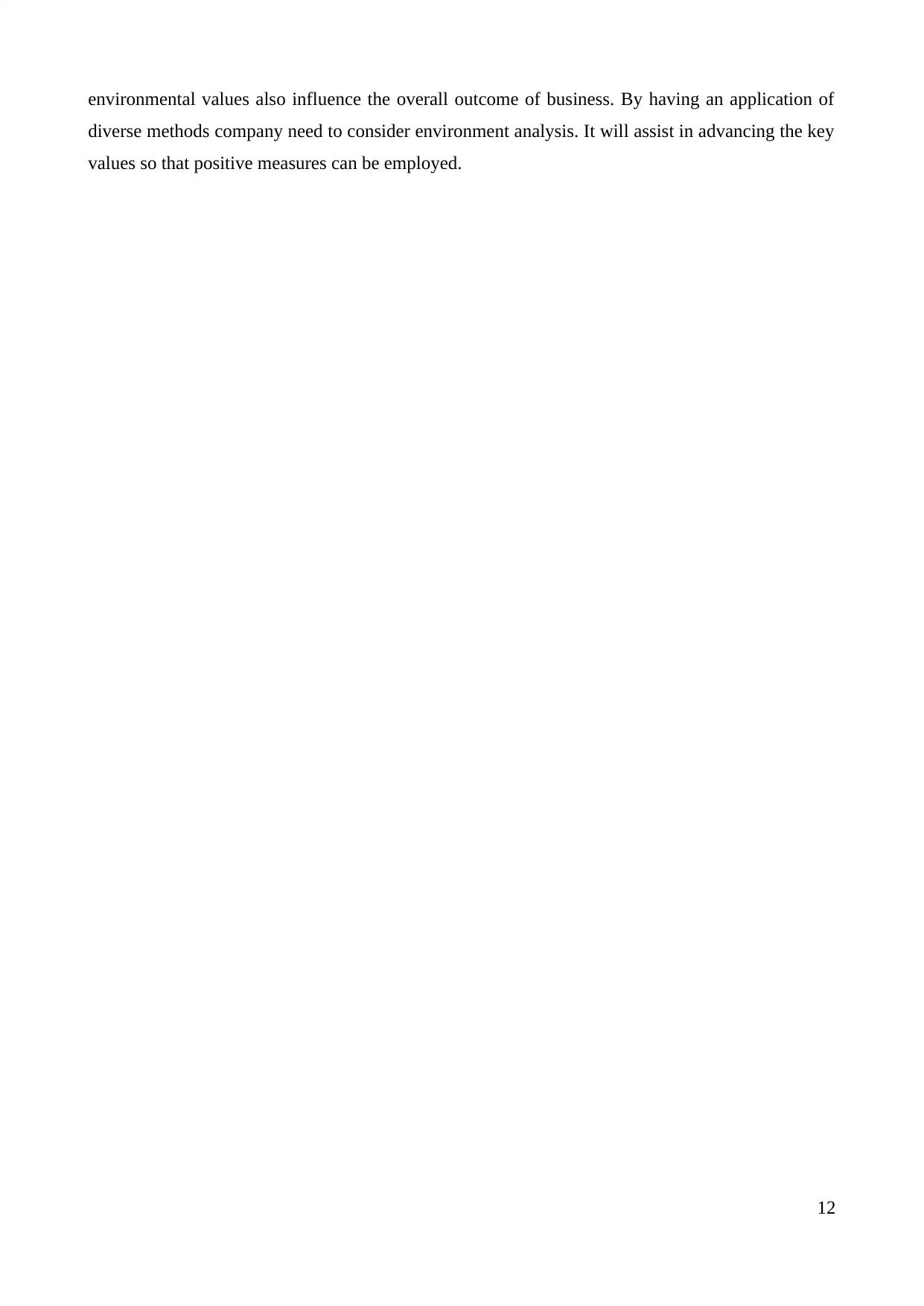
environmental values also influence the overall outcome of business. By having an application of
diverse methods company need to consider environment analysis. It will assist in advancing the key
values so that positive measures can be employed.
12
diverse methods company need to consider environment analysis. It will assist in advancing the key
values so that positive measures can be employed.
12
⊘ This is a preview!⊘
Do you want full access?
Subscribe today to unlock all pages.

Trusted by 1+ million students worldwide
1 out of 15
Related Documents
Your All-in-One AI-Powered Toolkit for Academic Success.
+13062052269
info@desklib.com
Available 24*7 on WhatsApp / Email
![[object Object]](/_next/static/media/star-bottom.7253800d.svg)
Unlock your academic potential
Copyright © 2020–2026 A2Z Services. All Rights Reserved. Developed and managed by ZUCOL.





